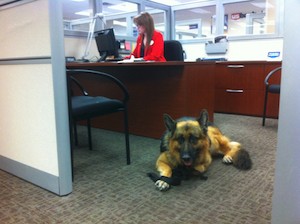 When you are confronted with an accommodation request by a customer or an employee who needs a service animal while on you premises, you must handle the situation appropriately.
When you are confronted with an accommodation request by a customer or an employee who needs a service animal while on you premises, you must handle the situation appropriately.
When customers make a request of for service animals, businesses must allow service animals to accompany a person with a disability or a service animal in training on the premises where the public is normally allowed to go. The service animal must be trained to perform tasks for the person with a disability, and its work must be related directly to the handler’s disability. The service animal isn’t required to be licensed or certified to be protected under the ADA. The animal must be harnessed unless the harness would interfere with its work; in that case, the handler must maintain effective control of the service animal with her voice or a signal. Furthermore, inquiries of the handler are impermissible. Employees may not ask about the person’s disability. Also, they may not request or require medical documentation from the handler or require a special identification card or training documentation for the service animal. Finally, they may not ask that the service animal demonstrate its ability to perform the work or task for which it is trained. Businesses may not exclude service animals or deny access to handlers based on allergies or fear of the service animals by others. The business should accommodate both the handler and the individual with the allergy or fear. Check your state’s laws as some limit the types of animals that are considered service animals.
Moreover, the regulations related to Title III of the ADA, which applies to “public accommodations,” require that service animals be granted access to all areas of government facilities, businesses, and nonprofit organizations where public access is normally allowed. The regulations accompanying Title III of the ADA (which covers discrimination in public accommodations) define a service animal as “any dog that is individually trained to do work or perform tasks for the benefit of an individual with a disability, including a physical, sensory, psychiatric, intellectual, or other mental disability.” Service animals also can be used to monitor medical conditions such as low blood sugar. Under Title III, service animals are limited to dogs that are individually trained to do work or perform tasks for a person with a disability, but you should check your state’s regulations as some extend protections to other animals.
When an employee asks to use a service animal in the workplace, you have the right to request documentation of his need for the service animal just like other accommodations. The Americans with Disabilities Act (ADA) addresses disability discrimination by private employers with 15 or more employees, but does not explicitly deal with service animals’ access to the workplace. However, employers are faced with determining whether allowing a disabled employee to use a service animal is a reasonable accommodation. Also, you may ask the employee to document or demonstrate that the service animal is trained to help with his medical needs and that the animal will not disrupt the workplace.
Service animals may be excluded by covered business for limited reasons:
- They aren’t under control;
- They aren’t housebroken; or
- They pose a direct threat to the health or safety of others or fundamentally alter the nature of the public place or the goods, services, or activities provided.
If a legitimate reason to exclude a service animal arises, employees should provide the handler with the opportunity to obtain goods or services without the animal’s presence, if at all possible.
